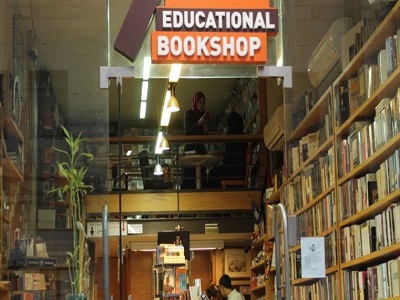
Two book stores, both named the Educational Bookshop, in Jerusalem, belonging to the Muna family, sell Arabic and English books and stationery which reinforce the Palestinian culture and identity.
Mahmoud Muna, the bookshop manager owns two bookstores, one for Arabic and the other for English literature. Originally named the ‘The Palestine Educational Bookshop’, the name was changed to the Educational Bookshop as, in 1984, it was illegal to have the word ‘Palestine’ in the title of an entity.
The bookshop stands in contrast to a market dominated by books reflecting an Israeli viewpoint. Furthermore, central to the identity of the bookstores is their location in Jerusalem: “We want to reinforce the notion of Jerusalem as the Palestinian capital,” says Muna.
THE EDUCATIONAL BOOKSHOP in occupied East Jerusalem shows how culture is a form of resistance. Nice feature by Al… https://t.co/Q8u468otlX
— David Cronin (@dvcronin) May 30, 2016
Various authors created a stir when their books were stocked, such as those of Edward Said, and even Israeli historians like Ilan Pappe and Avi Shlaim, who were critical of the Israeli narrative. Explaining the aim of the bookstore, Muna says, “The Palestinians have been stripped of their rights, political representation and freedom. The last thing we have is our culture – the last wall of resistance, which Israel will find very hard to break down. The mission of the bookshop is to reinforce Palestinian culture and identity.”
The store has about 1,500 titles from across the Middle East. Muna says: “This is not a Palestine-Israeli conflict; it was and is an Arab-Israeli conflict.” While the bookstore face the hurdle of the delivery and clearances of books which is often delayed.
Muna points out that there has been a renewal of Palestinian Arab readership: “I want them to read more serious, classic stuff: Books on Palestinian history, Arab nationalism, Arab communism, and the great literature of the Arab world”.
(AL JAZEERA, PC)





